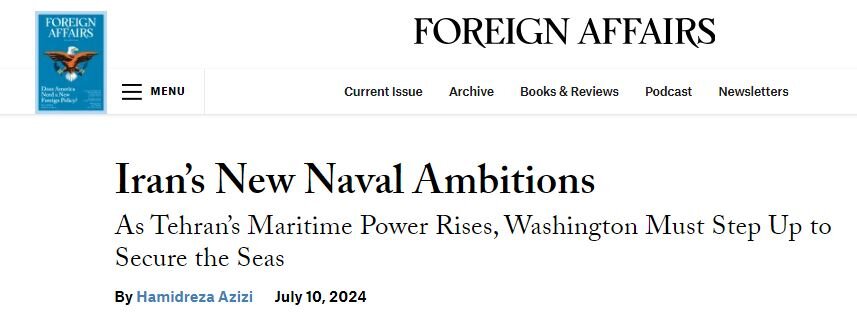The new concerns of an overextended power

TEHRAN- On July 10, 2024, Foreign Affairs published an article titled "Iran's New Naval Ambitions" written by Hamidreza Azizi. In this note, I will explore different aspects of the article and discuss the issue from a fresh perspective.
At the beginning of this article, and in the opening lines, Azizi states: "Since the start of the war in the Gaza Strip in October, the Red Sea has become a second battleground. The Houthis, an armed group based in Yemen and backed by Iran, have launched missiles and sent armed drones to strike commercial ships passing through the maritime route."
Instead of an action, the response of the Houthi forces should be seen as a reaction. It is a direct result of the Security Council's inaction and failure to fulfill its duties in action with respect to threats to peace, breaches of peace, and acts of aggression. According to Article 41 of Chapter Seven in the United Nations Charter, the Security Council has the power to take measures such as complete or partial interruption of economic relations and of rail, sea, air, postal, telegraphic, radio, and other means of communication, and the severance of diplomatic relations. As a result, if international trade is disrupted, the primary accused parties are the Security Council and countries that support Israel's expansionist actions. In this situation, maintaining security in international transportation is dependent on Israel's actions. If Israel ends the war, security will be established.
In a different section of the note, Azizi pens: "The Houthis may be leading this attack, but they are not acting alone." Certainly, the Houthis do not stand alone. In a scenario where Israel has long-standing alliances with external powers, receiving consistent military, financial, and media backing, leading to actions that threaten regional security, it is understandable for other parties to forge alliances to safeguard their own security and survival. In another part of the article, Azizi points out that "Lately, however, Iran's naval forces have acquired more advanced vessels, including new submarines and missile-armed warships, and have begun to venture as far as the Atlantic and Pacific Oceans. These changes are in line with Iran's ‘forward defense’ doctrine, adopted after the Iran-Iraq War in 1988 and consolidated in the early 2000s.” The application of the forward defense doctrine referenced by Azizi is in this framework. Endangering the security of a country by extra-regional forces requires an extra-regional response.
Azizi, while emphasizing the positioning of the revamped Iranian navy at the heart of the country's military strategy, points out that “Previously, U.S. military bases in [Persian] Gulf countries offered easy targets; when diplomatic tensions escalated and Washington intensified its pressure on Tehran, Iran could threaten to strike a U.S. base. But over the past two years, Iran has taken steps to reconcile with its Arab neighbors. Tehran's threats against the U.S. have significantly decreased a result.” It is important to consider that the enhancement of Iran's relations with neighboring Arab countries hinges on the absence of military actions launched against Iran from their territories. Neighboring countries have no interest in escalating tensions within their borders. This equation is straightforward: without threats originating from American bases in these countries on Iranian territory, there is no imminent danger. Otherwise, American bases within these countries' territories would become legitimate targets. According to what Azizi says, "Iran has begun to focus its threats on American interests farther afield." However, this does not imply bolstering the security of American bases in the region. Instead, it simply indicates Iran's interest in diversifying its objectives.
In another part of his note, Azizi suggested creating a security framework in the region with the presence of Iran: "A nonaggression pact between Iran and its neighbors could be the first step toward a regional security framework, as it would foster trust and lower the chances of clashes at sea. The United States needs to make clear to its partners that it supports such negotiations." If America is in favor of such negotiations, it should consider that the presence of American bases in the region will be one of the main issues raised. Essentially, these bases pose a significant obstacle to establishing a regional security framework involving Iran and the Arab countries of the Persian Gulf.
Also, in another part of his note Azizi suggests that "along with its diplomatic efforts, the United States should urge its regional partners to take military measures to contain Iran's maritime challenge." The question should be raised as to whether the countries in the region are willing to collaborate with the U.S. in addressing issues related to Iran and navigating new security challenges. It appears that the financial markets, trade sectors, and development programs of these countries may not be inclined to engage in such tensions. On the other hand, the maritime cooperation between Iran, Russia and China does not form a solid triangle and a country like China has enhanced its maritime relations with regional countries in addition to its maritime cooperation with Iran and Russia. For instance, we can cite the joint military exercises between China and the United Arab Emirates, highlighting the expanding relations between these nations. Consequently, countries in the region may explore alternative programs to enhance their security. At the end of the article, Azizi writes: "Washington will need to draw on the full range of its diplomatic and military tools in order to deny Tehran the advantage it seeks at sea."
The extent to which Washington can broaden its diplomatic and military capabilities is yet to be determined. The Ukraine conflict and the Russia problem, the genocide in Gaza, China's growing power, and now a new concern called Iran's naval power, along with everything that has preoccupied Washington's mind about Iran, consume the energy of this country. Now, as an overly extended power, America must make its choice and focus on specific options. If Iran's naval force is one of these options, Iran will also have its own choices.
Leave a Comment